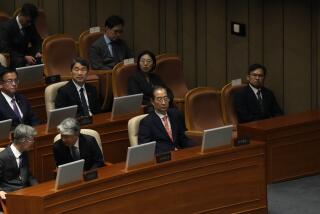2 Koreas Deadlocked on Legislative Talks
- Share via
PANMUNJOM, North Korea — In their first contact since the Olympic Games, North and South Korea squabbled their way into another deadlock Thursday on a proposed meeting of legislators from the two capitals. However, they agreed to meet again Nov. 17.
Neither side took issue with proposals that any meeting of legislators would discuss a declaration of nonaggression and a variety of exchanges. But there was no agreement on a specific agenda.
Meeting in a hall on the North Korean side of the border, the south accepted one point in the north’s proposal and agreed to send all 299 members of its National Assembly to Pyongyang, the Communist capital, for an opening session and to welcome all 665 members of the North Korean legislature to Seoul for a closing session.
But the two sides remained deadlocked on procedural matters. The south insisted that opening and closing sessions be confined to ceremonial matters, with decisions made by steering committees of up to 30 people each. The north insisted that all legislators attending take part in discussions and decisions.
“Can our 299 legislators spend one, two or three months in Pyongyang until decisions are made?” said Kim Bong Ho of the Party for Peace and Democracy, one of the three opposition party members in the South Korean delegation. “Can all of your legislators do the same in Seoul?”
North Korea’s Chun Kum Chul replied: “Your belief that a mass meeting would be inefficient and complicated is based on your attitude of confrontation. Inefficiency should not be the basis for rejecting a mass meeting.”
Neither side offered to amend its proposal.
Hopes Dashed
The deadlock dashed hopes that the north might show new flexibility in this first contact between the two Koreas since the recent Olympics in Seoul, which North Korea boycotted. This was also the first such meeting since South Korean President Roh Tae Woo accepted a proposal from President Kim Il Sung to go to Pyongyang and announced that South Koreans will be permitted to engage in trade with North Koreans.
Despite the south’s new proposal on the exchange of full legislative delegations, Park Jun Kyu, head of Seoul’s five-man delegation and a member of President Roh’s ruling Democratic Justice Party, showed little eagerness to pursue the talks--the only contact that exists between the two sides at the moment.
Asked by his North Korean counterpart to set a date for the next meeting, Park suggested Nov. 10. Chun replied that “any time would be fine,” and Park, without explanation, then suggested Nov. 17.
A Western diplomat, who asked not to be identified by name, said South Korea’s growing contacts with Pyongyang’s Communist allies and the success of the Seoul Olympics have left North Korea “in a sullen and nasty mood.”
To avoid driving the north into a corner, he said, new “carrots,” including “an opening of direct contacts with the United States,” will have to be offered.
Thursday’s meeting began cheerfully, with the south’s delegates noting that the Communists had installed a new, narrower table for the talks. At the last session, the table was so wide that the delegates could not reach across it to shake hands.
The south’s Park said he felt “the atmosphere was a little better this time.”
More to Read
Sign up for Essential California
The most important California stories and recommendations in your inbox every morning.
You may occasionally receive promotional content from the Los Angeles Times.













